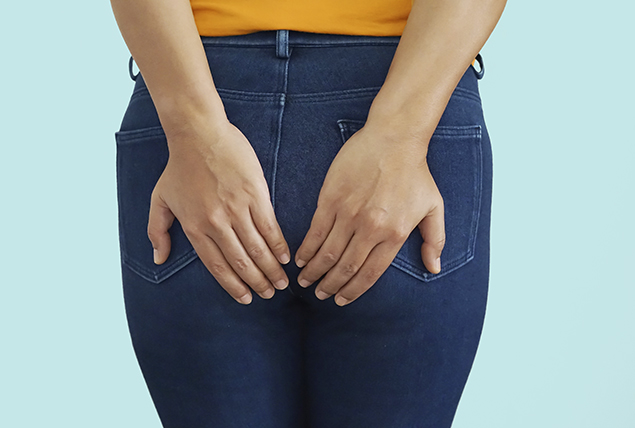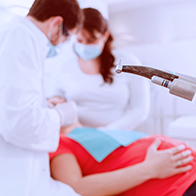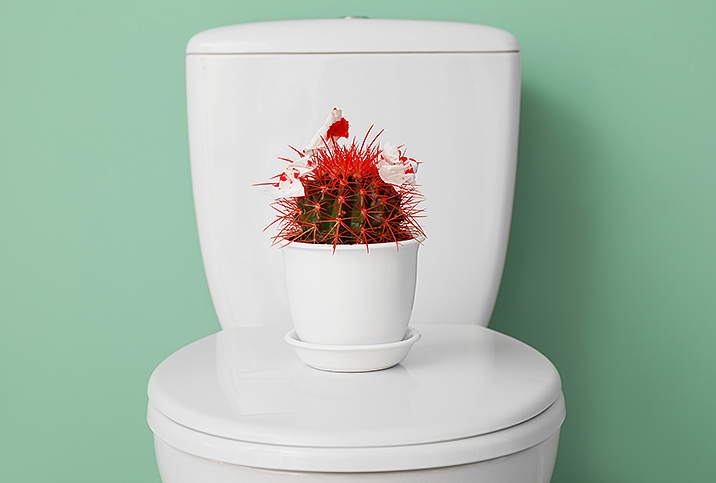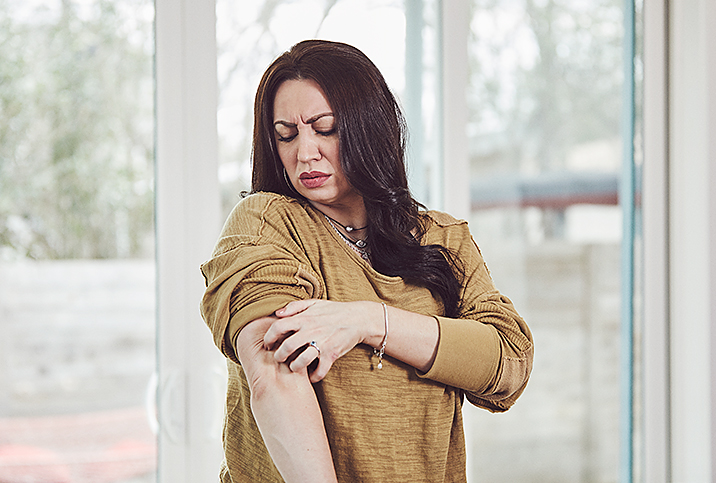Why Do You Get Hemorrhoids During Pregnancy?

Hemorrhoids are one of the most common conditions during pregnancy. Fortunately, you don't have to live with the pain, itching and sitting issues. You can safely treat hemorrhoids during pregnancy.
What causes hemorrhoids during pregnancy?
"Your baby applies pressure to the blood vessels in your pelvis. Some of these blood vessels include the blood vessels that go to your rectum," Miller said. "With the constant pressure your baby applies to the rectum, and its blood vessels, circulation decreases—and this causes hemorrhoids."
Women who are at higher risk for hemorrhoids during pregnancy are those patients who experience constipation and prolonged standing, said Kevin Alten, M.D., OB-GYN, an associate professor and academic coordinator at Marietta College with practice in Cambridge, Ohio.
Another frequent cause of hemorrhoids is constipation, a prevalent problem among pregnant women. Constipation can cause first-time hemorrhoids or aggravate symptoms due to straining to have a bowel movement.
The increase in progesterone during pregnancy can dilate blood vessels, too, provoking varicose veins in the legs and other parts of the body, such as the rectum.
Postpartum hemorrhoids are equally common because of labor—where a woman may be pushing for several hours, Miller said. This straining can cause new hemorrhoids to appear or worsen the hemorrhoids that develop during pregnancy.
What are the main symptoms of hemorrhoids?
The most frequent symptoms of these swollen varicose veins in the rectal area can include pain, itching and bleeding, according to Alten.
After bowel movements, your discomfort may worsen. The most frequent problems you may experience at this time include the following:
- Itching in the anus
- Pain during bowel movements
- Blood on the toilet paper, in the toilet bowl or in your stool
- Pain when sitting
- Swelling around the anus
- Lumps outside the anus
Hemorrhoids may be external or internal. External hemorrhoids have swollen veins visible from the outside, while internal hemorrhoids usually do not cause pain.
If you notice any symptoms, it is recommended that you discuss this with your healthcare provider because blood during a bowel movement may indicate a more serious problem.
When are hemorrhoids most common during pregnancy?
Hemorrhoids can develop at other points in life for various reasons. During pregnancy, it is estimated that up to 50 percent of women are affected, according to the Office on Women's Health. Hemorrhoids tend to appear more frequently when the patient has had hemorrhoids in the past.
The presence of these varicose veins in your rectal area can develop at any stage of pregnancy, but are more common or likely to worsen as the pregnancy progresses, especially in the last few months.
"Hemorrhoids are typically worse in the third trimester and postpartum. The third trimester your baby is larger, applying maximum pressure to your rectum," James Miller, M.D., OB-GYN, with a practice at Monarch OB-GYN in Wooster, Ohio, said.
How can you prevent hemorrhoids from occurring again?
"Early treatment of hemorrhoids can prevent them from worsening," Miller recommended some measures, such as staying hydrated and exercising during pregnancy.
One of the ways to avoid hemorrhoids is to have frequent bowel movements. Constipation can cause the veins in your rectum to swell. Healthcare providers recommend stool softeners if necessary for defecation and thus prevent constipation from causing other problems.
Proper nutrition is important to get better and prevent constipation.
"Eat a high-fiber diet and drink plenty of liquids to help avoid constipation," Alten said.
What are the dos and don'ts of hemorrhoids?
You should keep in mind what can help and what can make your hemorrhoids worse, according to Miller, you should consider the following:
- Preparation H wipes, and other witch hazel-based wipes, are very helpful to treat and avoid worsening of hemorrhoids
- Dry toilet paper can cause hemorrhoids to worsen
- Preparation H or another hemorrhoid cream can be used at night to relieve pain
- Warm tub baths are very helpful for the symptomatic treatment of hemorrhoids
- Stay hydrated
- Continue to exercise
- Avoid constipation with stool softeners, if necessary
Other recommendations are related to lifestyle changes in diet and daily activity—such as avoiding prolonged sitting, especially on hard surfaces because this puts pressure on the veins in your anus.
Bad bowel habits can contribute to constipation. Don't wait to go to the toilet. Straining when you have a bowel movement can make hemorrhoids worse. Use stool softeners with your doctor's permission.
Don't sit or stand for long. It can put extra pressure on the area.
Finally, Kegel exercises are often widely recommended by healthcare providers. Remember to consult your doctor before choosing any treatment. Certain medications are not recommended during pregnancy.
How can you change your diet to help prevent hemorrhoids?
If you want to have a better pregnancy, a diet change may be in order. In addition to water, add enough fiber to your daily diet. Fiber-rich foods will help you go to the bathroom regularly by making stools softer. Eat plenty of fruits and vegetables.
Fiber-rich foods you can include in your diet include:
- Whole grains, such as brown rice, oatmeal and quinoa
- Vegetables, such as artichokes, broccoli, carrots and Brussels sprouts
- Fruits, such as berries, avocados, apples, oranges and pears
- Legumes, such as lentils, black beans and chickpeas
- Nuts, such as peanuts and almonds
Fluids are essential to keep you hydrated and help you evacuate more easily. Drink water, broths and vegetable or fruit juices to help move things along.
Do hemorrhoids go away after childbirth?
Hemorrhoids are often managed without complications following the advice of a specialist. After delivery, hemorrhoids may disappear without treatment due to the decrease in pressure on the blood vessels and changes in hormone levels.
If hemorrhoids worsen or do not improve after childbirth, consult your healthcare provider. They can recommend the best treatments for you.




















